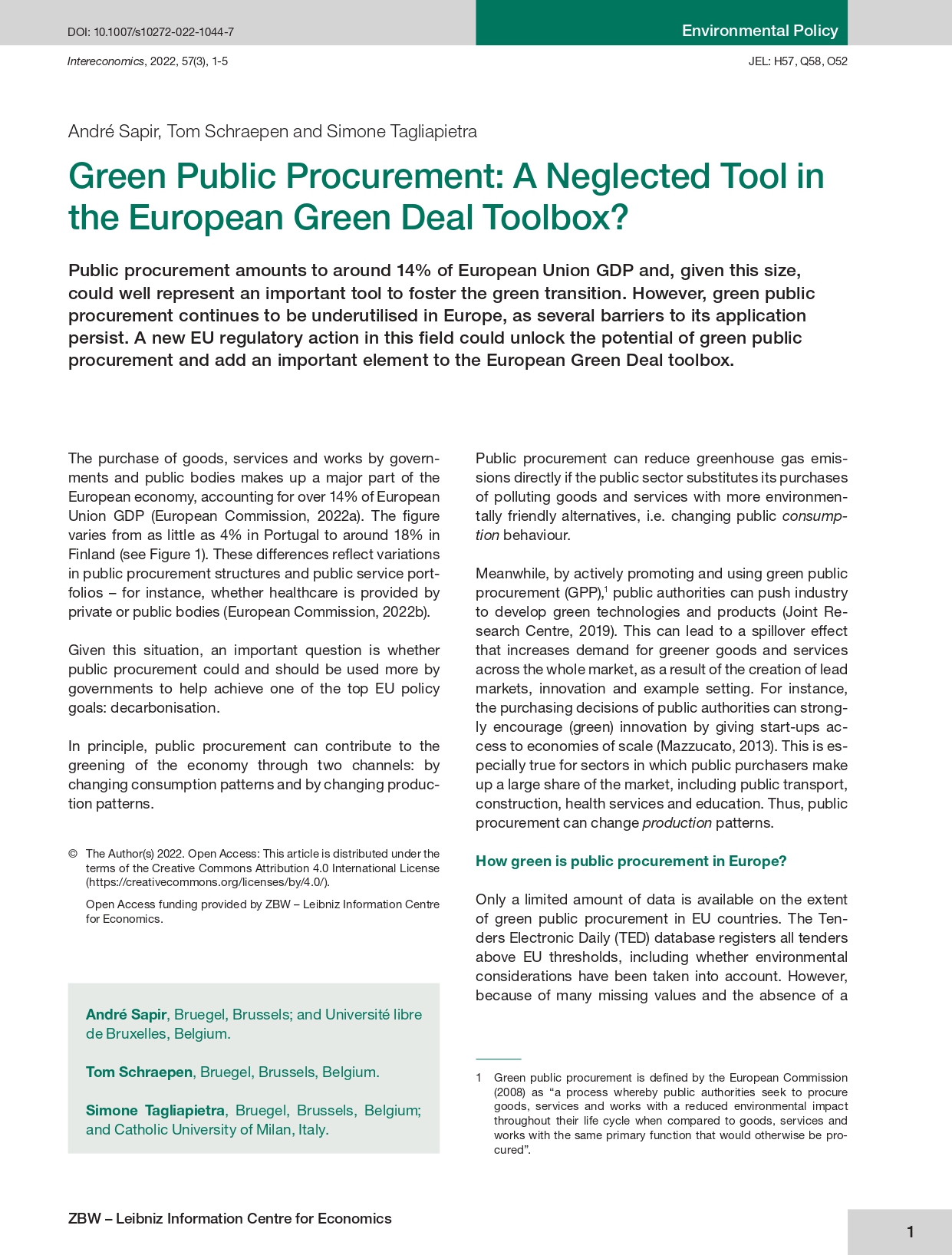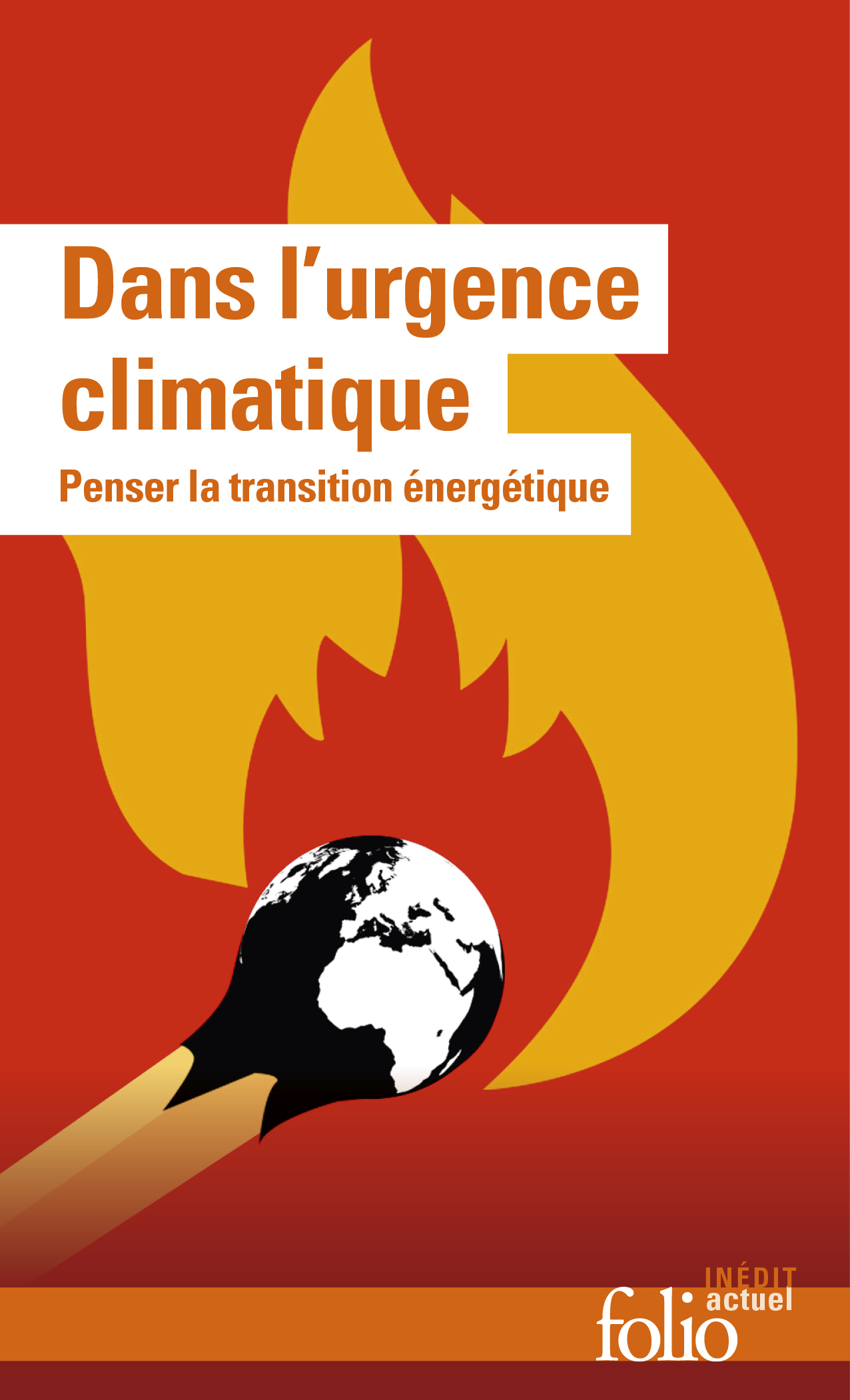Opinion
Why border carbon adjustment is important for Europe’s green deal
The European Commission President-elect Ursula von der Leyen is pursuing ambitious environmental targets, notably to reach zero net emissions across the EU by 2050. This transition requires pricing emissions to incentivise producers to develop greener alternatives, while avoiding putting domestic producers at a disadvantage.
This article was originally published in Brink News, Kathimerini, Nikkei Veritas, Le Monde, Helsingin Sanomat, Handelsblatt and Il Sole 24 Ore.

Border Carbon Adjustment
Border carbon adjustment (BCA) has been Ms. von der Leyen’s suggested remedy and deserves the attention of policymakers. Carbon leakage — the shifting of greenhouse gas-intensive production to places outside of the EU, where such emissions are not taxed — is a real concern. After all, the benefits of the tax in terms of lower emissions would be gone, while domestic jobs would be lost.
Already, the EU imports significantly more carbon dioxide than it exports — or, put differently, Europeans consume more greenhouse gases than they produce.
If the EU taxed only domestic producers’ carbon dioxide emissions, foreign producers would be put at an advantage to domestic producers, regardless of whether they are efficient or not. In contrast, among domestic producers, the more efficient ones with lower emissions would be advantaged relative to the less-efficient ones, but would still be at a disadvantage vis-à-vis foreign producers.
Preventing Carbon Leakage
Contrarily, if foreign producers are also taxed (the purpose of BCA), dirty producers, irrespective of their location, would have to increase production efficiency or lose EU market share.
Given the size of the European market, BCA would become a powerful incentive to improve production efficiency also in third countries. A carbon dioxide tax with BCA is thus a mighty instrument to:
- Reduce domestic carbon dioxide consumption.
- Prevent carbon leakage.
- Incentivise foreign and domestic producers to innovate (indirectly also reducing carbon dioxide consumption abroad).
Domestic producers would be relieved of this tax when exporting, with a tax rebate for exported goods, so they aren’t disadvantaged abroad.
Addressing carbon leakage, while politically difficult, is feasible, but not addressing it would partially undermine the benefits of domestic carbon taxation in reducing emissions.
Challenges for BCA
Three criticisms are voiced regarding BCA.
Firstly, critics have argued BCA would disadvantage emerging economies (which oppose it). But, adequately designed BCA would not change the relative price of domestic and foreign products. In practice, emerging market industrial processes may be less efficient, yet BCA has the stated purpose of incentivising foreign producers to reform.
Secondly, BCA could be considered “green protectionism” and be incompatible with the WTO. However, this depends on its practical design. The key to WTO compatibility is to design BCA in a way that it does not discriminate against foreign producers.
Thirdly, BCA may be practically unfeasible. While domestic producers’ emissions are easy to measure (inputs and overall factory emissions can be accurately determined), foreign producers’ emissions are harder to discern and to verify, especially down the value chain. But international standards and norms to establish products’ carbon dioxide emissions content are already in the making and can help overcome that difficulty.
A Value-Added Tax on Greenhouse Gas
A practical solution that satisfies BCA’s primary purpose and addresses some of the criticism is a value-added tax on greenhouse gas emissions.
In other words, for every product sold in the EU, a tax would be levied depending on the amount of greenhouse gases needed to produce that product. This poses a key question: How would one establish the GHG content of the product? Given the variety of products in European markets, the challenge is significant.
Essentially, every producer would be required to record the carbon dioxide content of their production. The detailed descriptions that are already attached to every product would be complemented with a clear value that reflects the amount of emissions. It would be on that value that the tax would be applied.
Recording a Product’s Carbon Dioxide Content
Domestically, such a system appears burdensome, yet not overly so. Public authorities, which carry out occasional quality checks on products, would also randomly check compliance with emissions reporting. If the numbers reported significantly diverged from the amount of carbon dioxide emitted, the producer would be liable to pay a fine. In fact, the EU could use standardized norms (such as ISO 14067), created to measure the carbon footprint of products, which would facilitate prompt application of this system.
True, this system would be burdensome and less efficient than taxing production directly. However, it would make it feasible to practically address carbon leakage. Foreign producers could automatically be treated like the least-efficient domestic producer, unless they proved otherwise.
A method for foreign producers to report their carbon content like domestic producers would have to be established. Efficient foreign producers would have a strong incentive to do this and should be ready to collaborate with domestic authorities (as they collaborate to prove safety standards compliance).
Certification Is Essential
Such a strong price mechanism should give rise to private agencies (carbon rating agencies) that monitor compliance and reporting accuracy — in fact, numerous consultancies already provide such services. An oft mentioned criticism is that this would disadvantage SMEs relative to larger companies. To address this criticism, the EU could even agree to pay the price of certification.
Overall, addressing carbon leakage, while politically difficult, is feasible. Not addressing it would partially undermine the benefits of domestic carbon taxation in reducing emissions and would certainly result in a backlash from the companies and workers that would see their jobs displaced.
Without BCA, the whole of the EU’s green deal may be put into question.
Republishing and referencing
Bruegel considers itself a public good and takes no institutional standpoint.
Due to copyright agreements we ask that you kindly email request to republish opinions that have appeared in print to [email protected].















